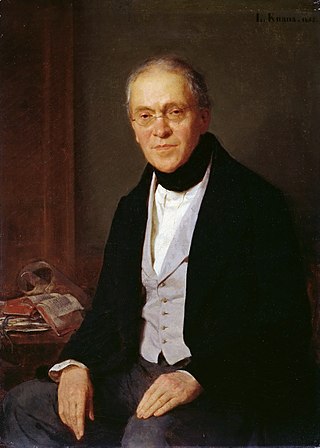
Gustav Friedrich Waagen was a German art historian. His opinions were greatly respected in England, where he was invited to give evidence before the royal commission inquiring into the condition and future of the National Gallery, for which he was a leading candidate to become director. He died on a visit to Copenhagen in 1868.
Wilhelm Heinrich Waagen was a German geologist and paleontologist. He was born in Munich and died in Vienna.
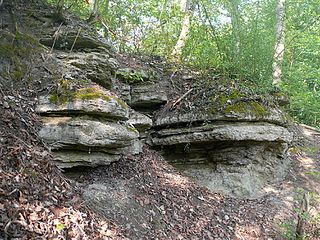
In the geologic timescale, the Anisian is the lower stage or earliest age of the Middle Triassic series or epoch and lasted from 247.2 million years ago until 242 million years ago. The Anisian Age succeeds the Olenekian Age and precedes the Ladinian Age.
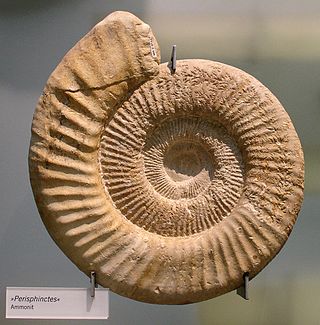
Perisphinctes is an extinct genus of ammonite cephalopod. They lived during the Middle to Late Jurassic epochs and serve as an index fossil for that time period. The species P. boweni was named after the English chemist and geologist E. J. Bowen (1898–1980).

Portrait of a Young Girl is a small oil-on-oak panel painting by the Early Netherlandish painter Petrus Christus. It was completed towards the end of his life, between 1465 and 1470, and is held in the Gemäldegalerie, Berlin. It marks a major stylistic advance in contemporary portraiture; the girl is set in an airy, three-dimensional, realistic setting, and stares out at the viewer with a complicated expression that is reserved, yet intelligent and alert.
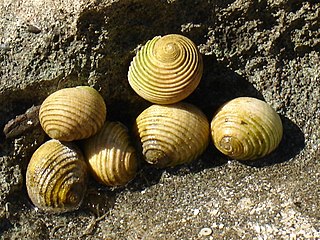
Cycloneritida is an order of land snails, freshwater snails, and sea snails.
Waagen is a surname. Notable people with the surname include:

A Man Smoking and a Woman Drinking in a Courtyard (1658–1660) is an oil-on-canvas painting by the Dutch painter Pieter de Hooch. It is an example of Dutch Golden Age painting and is part of the collection of the Mauritshuis.

Carl Diener was an Austrian geographer, geologist and paleontologist.

The Stone Bridge is a 1637 landscape painting by the Dutch Golden Age painter Rembrandt in the collection of the Rijksmuseum.
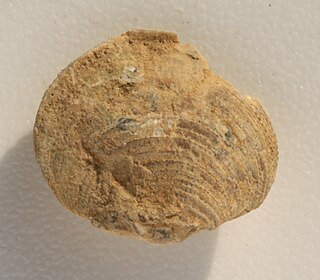
Cleiothyridina is an extinct genus of brachiopods.
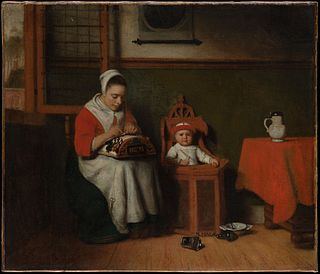
The Lacemaker is an oil on canvas painting by the Dutch painter Nicolaes Maes, created c. 1656. It is an example of Dutch Golden Age painting and is part of the collection of the Metropolitan Museum of Art, in New York.
Elise Bjørnebekk-Waagen is a Norwegian politician. She was elected representative from the constituency of Østfold to the Storting for the period 2017–2021 for the Labour Party. She was re-elected for the period 2021–2025.

Adalbert Waagen was a German landscape painter.
The following is a taxonomy of extant (living) Brachiopoda by Emig, Bitner & Álvarez (2019). There are over 400 living species and over 120 living genera of brachiopods classified within 3 classes and 5 orders, listed below. Extinct groups are not listed.

Nanette Schechner, real name Anna Schechner, married name Anna Schechner-Waagen, was a German operatic soprano.
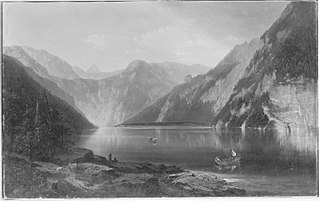
Carl Waagen was a German painter and lithographer.
Friedrich Ludwig Heinrich Waagen also Christian Friedrich Ludwig Heinrich Waagen, Wagen or Wage) was a German portrait, history and landscape painter. Hardly anything is known about his works. However, he had acquired extensive knowledge of art, amassed a collection of paintings in Hamburg and was known to friends with or in-laws of many important personalities of his time. Gustav Friedrich Waagen (1794-1868) and Carl Waagen (1800-1873) are his sons.
Stomatopora is a genus of bryozoans belonging to the family Stomatoporidae.
Stenodiscus is an extinct genus of bryozoan of the family Stenoporidae, known from the Carboniferous to the Upper Permian periods. Its colonies were large and could be encrusting, massive, or branching, sometimes made of multiple layers of growth over themselves, and usually possessed monticules with abundant large acanthostyles.













